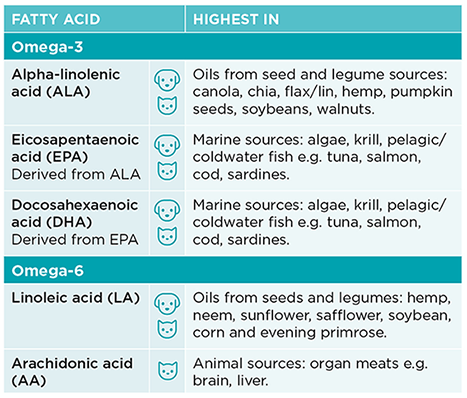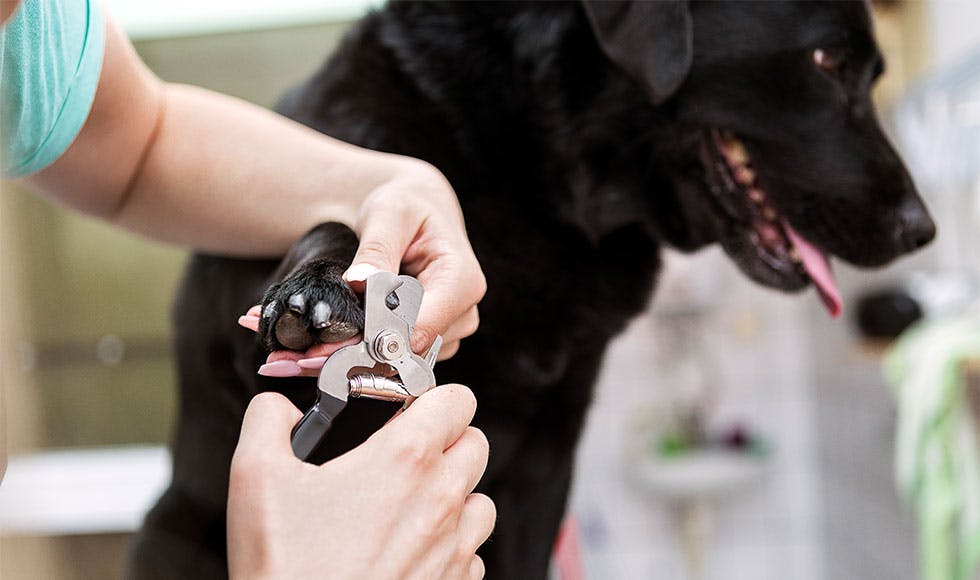
- A Guide To Perfect Your Pet's Health/
- Resources For Your Pet's Skin and Coat Health/
- Uncovering the secret of a healthy shiny coat


So, what are essential fatty acids?
Essential fatty acids (EFAs) are nutritional fats that are vital for many different biological functions in the body including: normal growth, optimal skin and coat health, supporting brain function, maintaining immunity, promoting joint health and so much more! They are considered essential because your pet’s body is unable to produce them naturally, meaning that they have to be acquired through their diet or via additional supplementation. With such an important role to play in so many body systems, there is little surprise that a deficiency of these EFAs can have a huge impact on their overall health!
Understanding omega-3 and omega-6 fatty acids
Essential fatty acids are classified into two key families, omega-3 and omega-6 fatty acids, depending on where the double bonds occur in their chemical structure.
Omega-3 fatty acids
There are three omega-3s that are essential for dogs and cats:
- Alpha- linolenic acid (ALA)
- Eicosapentaenoic acid (EPA)
- Docosahexaenoic acid (DHA)
ALA can actually be converted in the body into DHA and EPA. However, the process is highly inefficient in cats and dogs, so your pet is better off with a direct source of EPA and DHA through their diet.
Omega- 6 fatty acids
- Linoleic acid (LA)
- Arachidonic acid (AA) in cats only
Dogs can very efficiently convert LA to AA in their bodies and as a result, it is not an essential fatty acid for them! Our feline friends on the other hand, can’t make the conversion at all, so meat, liver and eggs serve as good sources of AA for them.
Fatty acids at a glance:

Both Omega-6 and Omega-3 fatty acids are vital for skin and coat health in your pet. Read on to find out how they can help your dog or cat.
Supporting your pet’s skin barrier with omega 6-fatty acids
To maintain a beautiful coat that you want to show off at every dog park, LA is your go to omega- 6 essential fatty acid. LA is vital for optimal barrier function, meaning that it keeps your pet’s skin and coat nicely hydrated by preventing water loss through the skin and also increases ceramide formation, the most abundant fatty molecule in the outermost layer of the skin. For dogs and cats with allergic dermatitis, supplementing them with omega- 6 fatty acids can also help to transform their dry, flaky skin, whilst concurrently boosting hair growth and improving overall coat quality.
Omega- 3 fatty acids and skin: It’s getting fishy in here!
If your pet suffers from allergic dermatitis, you’ll be happy to hear that omega- 3 fatty acids have been proven to decrease skin inflammation and to relieve incessant itching! In Dr Renée O’Duhring’s words (The Natural Vets, Sunshine Coast Holistic Vet Clinic), “omega-3 fatty acids are the ‘good fats’ that help to keep a lid on inflammation”. Whilst our plant-based omega-3 ALA can still provide health benefits for your pet, EPA and DHA, found in high quantities in fish and other marine sources are by far our so called ‘favourites’.
So, if omega-3 fatty acids come from fish, can you just stock up on tinned sardines and be done with it? The answer is yes and no. “When it comes to treating established health problems, it’s difficult to achieve therapeutic levels of fatty acids without using a supplement. You’d need to feed your pet a huge amount of sardines or salmon to get the same level of omega-3s provided in a fish oil supplement, simply due to the concentration of the product,” Dr O’Duhring says. “You’d probably end up with an obese pet!”
In addition, when considering supplementation, it’s important to remember to use a fish oil supplement that’s specifically designed for dogs and cats, not humans. “A lot of human fish oil products are flavoured, but pets prefer oil that just tastes like the fish it came from. Dogs also have different requirements for getting the right balance of DHA and EPA. So, if you use a human supplement, you might not be getting an ideal ratio of the two,” says Dr O’Duhring.
Supporting your pet’s skin with PAW
As an aid to common symptoms of allergic skin conditions that can cause them significant discomfort, PAW Dermega Skin Support promotes healthy skin in dogs with dry itchy skin. Dermega includes omega- 3 and 6 essential fatty acids from fish and linseed oil to improve your pet’s coat shine and lustre.
When to use:
- Ideal for dogs with inflamed, allergic and/or itchy skin.
- Beneficial for pets with dry, flaky skin for long term barrier health.
- Suitable for pets with normal skin to maintain a healthy shiny coat.
A concentrated blend of liquid fish oil with no added artificial colours or flavours. It contains Blackmores Fish Oil with omega- 3 fatty acids, EPA and DHA, formulated specifically for pets based on standard ratios recommended by the US National Research Council.
Available for sale in vet clinics only.
When to use:
- Ideal for pets with inflammatory skin conditions.
- To support joint, skin, heart, kidney and brain health.
- Reduces the requirement of anti- itching pharmaceuticals when used concurrently.

.jpg&w=3840&q=75)


